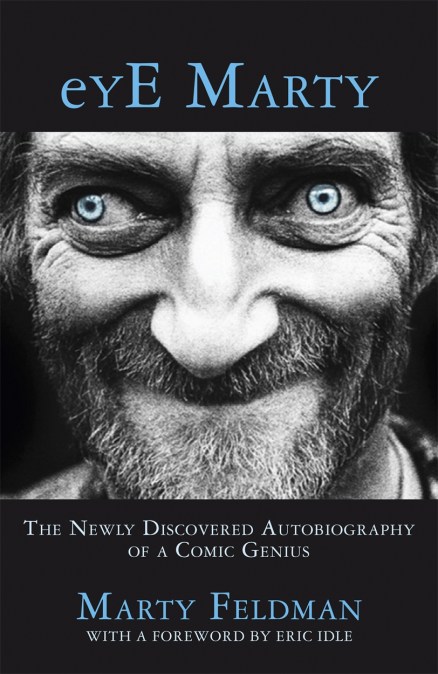Completed before he died, thirty years ago, this is the newly discovered autobiography of one of the most influential comedians of recent times, Marty Feldman.
Marty was a professional writer, and considered himself a writer first, and an actor second. Feldman created a number of immensely successful and influential shows such as Marty, The Frost Report and sketches for Monty Python. He was one of the most essential creative forces in British comedy embodied also by his close friends and creative partners from Beyond the Fringe (especially Peter Cook and Dudley Moore) and Monty Python (especially John Cleese, Graham Chapman and Eric Idle).
Marty played the fool, often very happily and with tremendous talent and volcanic, anarchic energy, for his entire life. His face is what many people most immediately remember. It was a face that David Frost, one of his bosses, characterised as ‘too grotesque’ for television – see what Feldman has to say about Frost, and Francis Bacon, and John Lennon…
Marty Feldman finished, and set aside eYE Marty soon before travelling to Mexico to shoot his final film. He did not know that he would die there, although he certainly felt he might die soon, and was haunted by the notion. The book is exactly as Feldman wrote it: Mark Flanagan had it transcribed, with even the photos inserted where Feldman had noted they should go.
Hilarious, deeply charming, aphoristic, ironic, charged throughout with lust for life and filled with scenes of great vanished eras and and portraits of other performers and friends, eYE Marty is the amazing discovery of the story of a man who was at the heart of the British comedy revolution.
Marty was a professional writer, and considered himself a writer first, and an actor second. Feldman created a number of immensely successful and influential shows such as Marty, The Frost Report and sketches for Monty Python. He was one of the most essential creative forces in British comedy embodied also by his close friends and creative partners from Beyond the Fringe (especially Peter Cook and Dudley Moore) and Monty Python (especially John Cleese, Graham Chapman and Eric Idle).
Marty played the fool, often very happily and with tremendous talent and volcanic, anarchic energy, for his entire life. His face is what many people most immediately remember. It was a face that David Frost, one of his bosses, characterised as ‘too grotesque’ for television – see what Feldman has to say about Frost, and Francis Bacon, and John Lennon…
Marty Feldman finished, and set aside eYE Marty soon before travelling to Mexico to shoot his final film. He did not know that he would die there, although he certainly felt he might die soon, and was haunted by the notion. The book is exactly as Feldman wrote it: Mark Flanagan had it transcribed, with even the photos inserted where Feldman had noted they should go.
Hilarious, deeply charming, aphoristic, ironic, charged throughout with lust for life and filled with scenes of great vanished eras and and portraits of other performers and friends, eYE Marty is the amazing discovery of the story of a man who was at the heart of the British comedy revolution.
Newsletter Signup
By clicking ‘Sign Up,’ I acknowledge that I have read and agree to Hachette Book Group’s Privacy Policy and Terms of Use
Reviews
He was a pioneer of comedy who inspired pioneers of comedy, a hero to my comedy heroes.
No one has ever made me laugh as hard as Marty Feldman in Young Frankenstein, he was pure comic perfection.
He was totally unique. Like something out of mythology. But funny.
A fascinating insight into the mind of Feldman for weirdos everywhere. Long live this comic genius.
The only thing more wonderful than this book is actually watching Marty Feldman perform. Both thrill me.
This is a warm and engaging memorial.
Feldman's life...is extraordinary...Another early Feldman sketch finds Cleese in a railway compartment irritated unto violence by the inane interruptions of his fellow passenger, a wing-collared Marty. In the end, Feldman simply disappears, but his voice persists. This too is a prophetic metaphor for Feldman - his early death, his lingering influence and, yes, his genius.
